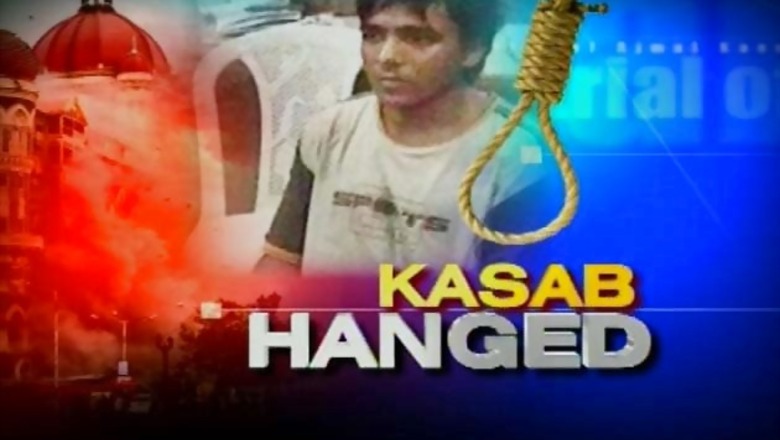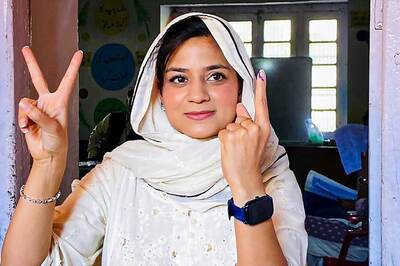
views
New Delhi: India and Pakistan on Wednesday sparred over communication about the hanging of the lone surviving terrorist of the 26/11 Mumbai terror attacks Ajmal Kasab. Immediately after the hanging was carried out in Pune, Home Minister Sushil Kumar Shinde said Indian mission in Islamabad had informed Pakistan government about the hanging. "The External Affairs Ministry through our mission in Islamabad had informed the Pakistan government about Kasab's hanging. When they did not accept the letter, they were communicated through fax," he said in Delhi.
External Affairs Minister Salman Khurshid said he hopes Pakistan will deliver on 26/11 trial after Kasab's execution. Khurshid says Ajmal Kasab and Sarabjeet's cases are not similar and India will continue to hope for Sarabjeet's release and will not give up its efforts.
Pakistan, on the other hand, came out with a statement asserting that it had "received that note and acknowledged its receipt." The Indian Deputy High Commissioner visited the Foreign Office in Islamabad on Monday evening with the note regarding Kasab's execution and the Director General for South Asia in the Foreign Ministry "received that note and acknowledged its receipt," Pakistan Foreign Office spokesman Moazzam Khan said.
Reacting to Pakistani assertion, sources said, as of now, the Indian High Commission has not received any acknowledgement from their foreign ministry. "Indian Deputy High Commissioner had met his counterpart in the Pakistan Foreign Office DG (South Asia) on November 20 to hand over a communication with a copy of the letter from the authorities in the State of Maharashtra addressed to the next of kin of Kasab informing about the completion of the legal process and the hanging of Kasab on 21 November.
"The official had refused to accept the communication, following which the same was faxed from the Indian High Commission to the official and a transmission report received," sources said. 25-year old Kasab was hanged at 7.30 AM at the Yerawada Jail in Pune on Wednesday morning.
Pakistan rejected India's assertion that it refused to accept a letter on the decision to hang Kasab, saying it had "received that note and acknowledged its receipt". Reacting to the execution of Kasab in a jail in Maharashtra, Foreign Office spokesman Moazzam Khan said Islamabad had adopted the clear and consistent position of condemning terrorism in all its forms. On India's assertion that it had informed in advance Pakistan about the decision to hang Kasab but Islamabad refused to acknowledge the letter, Khan said, "these reports are incorrect and baseless."
The Home Minister told CNN-IBN that Congress President Sonia Gandhi was not informed about the operation. "The MHA kept it a top secret. Even the Congress Core Group wasn't told. I never informed Sonia Gandhi about it. A very small group knew about it," he says. 26/11 martyr Vijay Salaskar's wife and daughter welcomed the news, and said that this is just the beginning of justice.
"His execution is a tribute to the victims of 26/11 attacks," said the Home Minister of Maharashtra, RR Patil. Chief Minister Prithviraj Chavan told CNN-IBN that Kasab was shifted out of Mumbai's Arthur Road Jail to Pune's Yerwada Jail two days ago, on Monday. Yerwada Jail is meant for convicts and has provision for their execution. The CM admitted that secrecy had been maintained over Kasab's execution as they did not want to compromise the security situation in any way.
Sources said that Kasab was provided all information before the execution and the jail manual was followed. When he was asked for his last wish and whether he had a will, Kasab said no. Yerwada Jail sources said that the High Court had been asked to inform Kasab's family.
In September, the Maharashtra Home Ministry had recommended that the LeT terrorist's mercy plea be rejected. Kasab had been sentenced to death in May 2010 for his role in the savage attacks that ripped apart Mumbai on 26 November 2008, killing over 150 people, including several foreigners.
Meanwhile, the lawyers of Kasab expressed surprise at the "sudden" hanging of the lone surviving Pakistani gunman in the Mumbai attack and raised questions over the execution being shrouded in secrecy. "I was shocked. It was all of a sudden. Why was the execution shrouded in such secrecy," Defence lawyer Amin Farhana Shah said.
Shah along with Amin Solkar and Abbas Kazmi appeared for Kasab in the sessions and Bombay High Court. "May be guarding him for so long was becoming a burden on the exchequer. But why the secrecy ?" Solkar asked. Solkar, however, said it is good that the government expedited this case as it must have been done in the interest of the society and victims.
Solkar and Shah defended Kasab in the High Court after they were appointed by it to appear for the accused. Kazmi, who appeared for Kasab before the sessions court, opined that the government might have taken Kasab's mercy petition out of turn as it was an exceptional case. "This case had international ramifications also. The common man was waiting for this execution. Even the victims will be at some peace now," he said.
Kasab was the only survivor of a group of 10 terrorists trained and backed by the Pakistan-based Laskhar-e-Toiba (LeT) that targeted the Indian financial hub four years ago. A total of 166 people, including several foreigners, were killed over a period of three days by the attackers, who were controlled by handlers based in Karachi.
Pakistani authorities have arrested LeT operational commander Zakiur Rehman Lakhvi and six others and charged them with planning, financing and executing the attacks. However, their trial by an anti-terrorism court has virtually stalled for over a year due to various technical reasons. Islamabad has rejected Delhi's calls for action against LeT founder Hafiz Mohammad Saeed, the mastermind of the attacks, claiming India has not provided any evidence to facilitate his prosecution.
Pakistan also said it had not received any request from Ajmal Kasab's family to bring back his body following the execution in an Indian jail. Any request from Kasab's family to bring back the body would be handled in accordance with Pakistani laws, Interior Minister Rehman Malik said. "No member of Ajmal Kasab's family or relative has requested the government (to bring back the body). When any member of the family makes a request, then we will take it up with the Indian government," he said.
Meanwhile, leading rights activist Ansar Burney offered to help in bringing back the body if Kasab's family contacts his organisation in this regard. He said he had no sympathy for Kasab but the family had the right to bury the body in accordance with Islamic traditions.
Both Central and Maharashtra governments have spent around Rs 29.5 crores on Kasab to provide him food, security, medicines and clothes during his confinement in Arthur Road Central prison in Mumbai, sources said. Indo-Tibetan Border Police (ITBP) deployed around 250 guards for Kasab in the prison since his arrest in November 2008 till October 2012 and expenditure on this count worked out to Rs 26 crore, sources said.
Maharashtra government spent around Rs 3.47 crores on Kasab including food (Rs 42,313), security (Rs 1,46,81,794), medicines (Rs 39,829) and clothes (Rs 1,878). The state government also incurred an expenditure of Rs two crores on building a bullet and bomb proof cell especially for Kasab in the Central Prison at Arthur Road. The cell was connected to the specially made court (also bomb and bullet proof) by a tunnel which was fortified with iron walls and ceiling to ward off any terrorist strike with bombs.
This is for the first time that such a bomb and bullet proof cell has been made in the prison. This would also serve as a permanent place for any dreaded terrorist or dangerous accused who gets caught and has been put on trial, sources said. ITBP commandos stood as guards in and around the Arthur road Central Prison for nearly four years to keep a watch on Kasab, who unleashed terror in Mumbai on November 26, 2008, at the instance of Lashkar-e-Taiba (LeT).
Kasab's planned execution is apparently one of the reasons that India did not agree to the two-day proposed visit of Pakistan's Interior Minister Rehman Malik from Thursday. Sources in the central security agencies claimed although India had kept under wraps the date of hanging of Kasab, it didn't want an uncomfortable situation to arise during the visit of Malik.
Malik had expressed his desire to visit the country during his meeting with Shinde in Rome on November 3. The sources said Kasab's execution date was finalised after President Pranab Mukherjee on November 5 rejected his mercy plea. When the dates of November 22-23 were proposed from Islamabad, the Home Ministry said these were not feasible.
With Additional Inputs from PTI
Watch: Confessions of Ajmal Kasab, the 26/11 Pakistani terrorist
####
Tweets about ”kasab”
!function(d,s,id){var js,fjs=d.getElementsByTagName(s)[0];if(!d.getElementById(id)){js=d.createElement(s);js.id=id;js.src="//platform.twitter.com/widgets.js";fjs.parentNode.insertBefore(js,fjs);}}(document,"script","twitter-wjs");




















Comments
0 comment